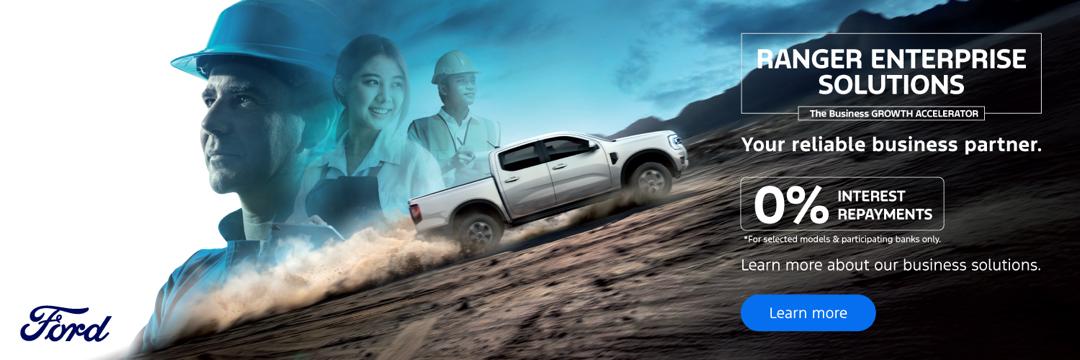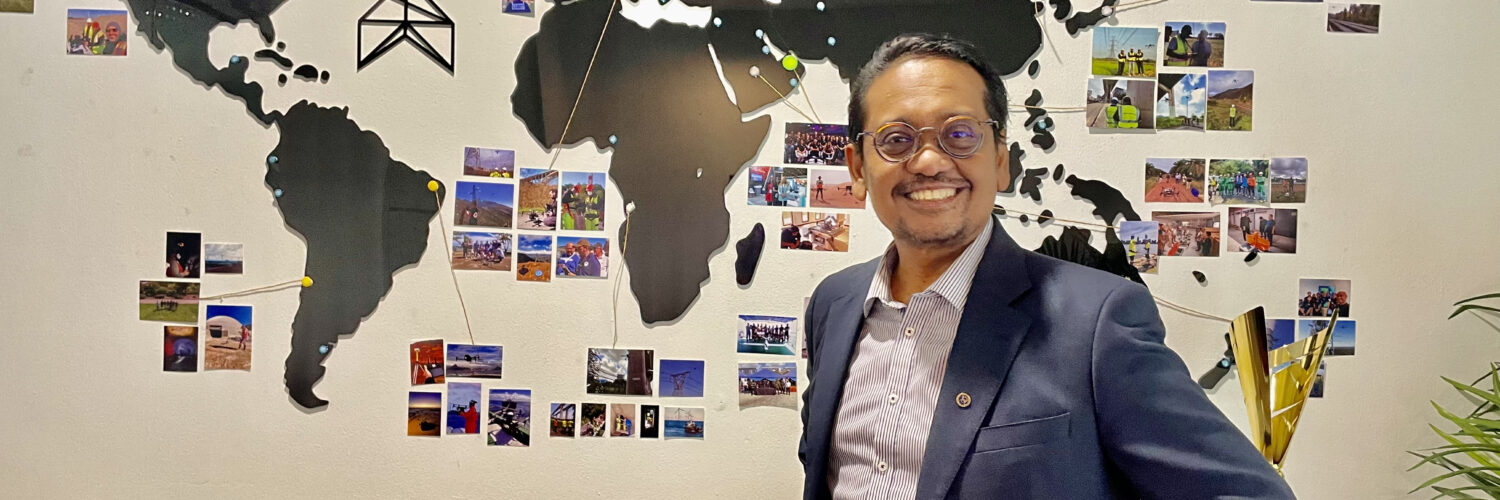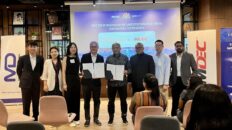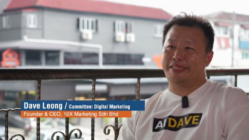In this heart-warming conversation with Malaysia SME’s, Aileen Anthony, Kamarul shared the mind sets and mind shifts that powers Aerodyne’s growth, the challenges of scaling a globally competitive tech-driven enterprise, and his vision for the future— where drones don’t just assist industries but redefine them.
Of Unrelenting Resilience
There are certain conversations that leave an indelible mark. My conversation with Kamarul A Muhamed, the visionary founder and CEO of Aerodyne Group, was one such encounter. On the dot, Kamarul entered the room and as effortlessly as he made me feel at ease, eased himself into a blow by blow account of his entrepreneurial journey.
Listening to him, I found myself immersed in the story of a man who has not only built a company but is shaping entire industries. His journey—from an entrepreneurial gamble to a global powerhouse—is a testament to resilience, adaptability, and an unrelenting pursuit of innovation.
Anything but Conventional
Kamarul’s approach to business is anything but conventional. He likens the startup journey to entering a jungle—unpredictable, dangerous, yet full of opportunities. The analogy is striking because it encapsulates what entrepreneurship truly demands: the ability to survive, learn, and evolve. He says many startups falter before they even find their footing, and those who succeed do so through sheer grit and an ability to navigate the unknown.
He doesn’t believe in blind optimism—entrepreneurs must temper self-belief with adaptability.
What struck me most was his perspective on exposure and experience. He doesn’t believe in blind optimism—entrepreneurs must temper self-belief with adaptability. It’s not enough to have a vision; one must have the ability to execute while continuously learning. This lesson has shaped his journey, and he continues to impart it to those who aspire to build something meaningful, often hosting sessions at home with aspiring founders eager to gain insight from his experiences.
From Starting to Scaling and Sailing
Kamarul categorises the entrepreneurial journey into three distinct phases: the startup stage, the scale-up stage, and the “sail-away” stage. The startup stage is raw, unforgiving, and filled with missteps. Founders enter enthusiastically, only to realise they are woefully underprepared for business realities. “It’s like thinking a small knife will do, only to discover you need a parang,” he quipped.
– he believes traditional business education, particularly an MBA, can sometimes hinder a startup’s progress.
Then comes the scale-up stage, where chaos gives way to structured growth. Here’s where Kamarul diverges from conventional wisdom—he believes traditional business education, particularly an MBA, can sometimes hinder a startup’s progress. Puzzled, I asked him to elaborate. “An MBA teaches you to optimise resources, but you cannot optimise in a startup. You build something out of nothing,” he explained. That line stayed with me because it encapsulates the resourcefulness required in building from scratch.
Even in the final stage—the “sail-away” stage—where a company is stable, Kamarul insists that a startup mentality must persist. “Every day must feel like Day One,” he told me. Even as Aerodyne scaled to over 1,000 employees, he continued to push for agility and innovation, never allowing complacency to take hold.
A Thriving Entrepreneurial Ecosystem
Malaysia’s startup ecosystem is evolving, and Kamarul remains optimistic about its trajectory. While the country isn’t Silicon Valley or Singapore, it has unique strengths. Despite funding challenges, Malaysian entrepreneurs continue to find creative ways to scale, as seen with Grab, which remains committed to innovation even after a decade. That same ambition drives Aerodyne, whose DT3 solutions—drone technology, data technology, and digital transformation—address complex industry challenges.
What resonated with me was his emphasis on collaboration. He pointed to cultures that thrive on knowledge-sharing, particularly Japan’s “giving” culture and the openness he witnessed in the UK startup ecosystem. “Ideas should flow freely,” he said. “Malaysia can embrace that same spirit of collaboration and support.” His words made me reflect on how often we operate in silos, guarding ideas instead of nurturing collective progress.
He hopes for more clarity and cohesiveness in policies, funding, and mindset—not a mindset that vilifies failure but one that celebrates victories.
He hopes for more clarity and cohesiveness in policies, funding, and mindset—not a mindset that vilifies failure but one that celebrates victories, however small, as they pave the way for more considerable achievements. Because of the stress of leading and growing a business—only a founder truly understands that weight, and it is never without painful lessons along the way.
Lessons in Product Development
One of Kamarul’s most costly lessons came in software and product development. He hired a team of highly experienced engineers, only to realise that poor product design and direction made it an expensive mistake. “Software development is about iterative design and product-market fit,” he reflected. Without clear direction, even the best engineers can flounder.
When struggling to find the right talent locally to develop Aerodyne’s Industrial AI SaaS, he turned to global hiring—an example of creative problem-solving that transformed the company’s trajectory. The breakthrough came when he met an individual in the U.S. who would become Aerodyne’s Chief Innovation Officer. “That was the game-changer,” he said. “I could dream the idea, and he could execute it perfectly.” Today, Aerodyne has three CTOs leading different branches of development, ensuring alignment between vision and execution.
“A great product doesn’t come from a boardroom but from deep user insights, constant iteration, and the right people.”
Kamarul A Muhamed, Founder and CEO of Aerodyne Group
What Kamarul has learned is that success isn’t about the idea—it’s about solving real problems and executing relentlessly. “A great product doesn’t come from a boardroom but from deep user insights, constant iteration, and the right people.” That’s why he now dedicates his time daily to product development—”because without an exceptional product, everything else is just noise”.
Expanding Global Impact
With a presence in over 45 countries, Aerodyne isn’t just about drones—it’s about data intelligence, automation, and solving real-world problems. The company’s technology is revolutionising industries, from predicting landslides to optimising agricultural yields. “Anywhere a drone can go, it can be retrofitted with sensors to collect critical data,” Kamarul explained. The scope of Aerodyne’s impact is staggering, and it’s clear the company is only scratching the surface of what’s possible.
Aerodyne is shaping the future of smart city management, precision agriculture, and environmental sustainability, among many other areas.
His commitment to innovation remains steadfast. Through R&D and strategic partnerships, Aerodyne is helping shape the future of smart city management, precision agriculture, and environmental sustainability. “We are not just flying drones; we are revolutionising industries,” he said with conviction. And I feel optimistic as well.
Of Purpose and Execution
Reflecting on our conversation, one phrase stood out, “Remember your purpose. Execute your mission.” Kamarul shared that he learned this lesson in China, where he witnessed firsthand how purpose-driven execution separated successful entrepreneurs from those who floundered.
“You don’t wait for perfect conditions. You don’t let failures stop you. You build, you adapt, and you keep moving forward.”
His story proves that Malaysian entrepreneurs can compete on the world stage—not by replicating Silicon Valley but by forging their path grounded in resilience, vision, and a willingness to evolve. Aerodyne’s journey is far from over, and as I walked away from our conversation, enlightened by his humanity and humility, I knew one thing for sure – Kamarul A Muhamed and Aerodyne aren’t anywhere near done forging the future.









